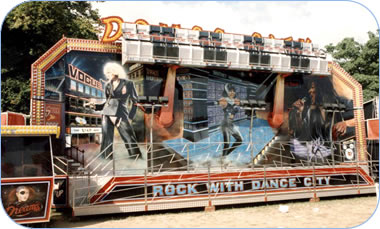FAIRGROUND RIDE
Completed Miami Fairground Ride – a total of 29 units were built
Customer’s needs
As one of the larger fairground operators in the country the client wanted to expand their business of manufacturing Fairground rides.
what is Rapid Prototyping And Prototype Manufacture click here
Specialising in the charter fair business the rides have to fit within the European long vehicle regulations.
The client had commissioned a company to design a ride however the resulting ride of which four were built was not reliable nor was it felt to be as strong as it should be.
The client was seeking not only a safe and reliable ride but they also wished to be able to offer a ride which would be viewed by the industry as the best on the market.
Selling for in excess of £200,000 per machine the ride needs to be able to operate continually for many hours at a time once they have been set up. The charter fair regulations mean it is not uncommon that they can only be operated for one or two days before they have to be moved to the next site.
how 3D Cad Modelling click here
The operating conditions of these rides impose a number of performance requirements on the designer and manufacturer including:
• Very high level of reliability
• Possible to set up on site and collapse for travel in a short period of time and ideally needing no more than 2 staff
• The ride should only need one person to operate it safely
• It should be as large as possible when deployed
• It should be totally self sufficient
• It should ideally be capable of generating G forces on the riders just in excess of 1G
• The level of technical expertise required to maintain the ride should not need to be of a high level
• The complete unit must fold down into a volume which meets the trailer standards for large articulated lorries
How the customer’s needs were met
Prior to starting the design time was spent visiting a number of fair sites discussing with operators (potential customers) the features that they were not happy with on their existing rides and features that they would like to see in a new ride.
From this not only was it possible to confirm a significant demand for this type of ride, but it was also possible to establish the features that would best satisfy the needs of the market.
Based on this exercise concept designs were produced. After discussions with the client a final concept specification was prepared. Full engineering drawings were then produced together with a full parts list.
In addition to the engineering design features such as anti-lock brakes, hydraulic and electrical power systems, stabilizers and display lighting had to be defined and suppliers identified. Performance criteria such as turning circles, ease of storage and methodology of setting up and preparing for travel also had to be considered as part of the design.
Having carried out these tasks Ideas2Reality was then asked by the client to supervise and manage the manufacture of the initial ride by their nominated fabricator. This was undertaken and the initial ride was manufactured and tested. This was completed within three months in time for delivery to the first customer at the beginning of the fair season.
Features included in the ride (which have now become standard in the industry) were:
• Trailer (actually part of the ride) fitted with anti lock brakes
• Sealed for life bearings
• Hydraulic actuators fitted to back panels, jack and leveling systems, etc. Enables the complete ride to be opened up and folded down for transport by a single operator in 20-40 minutes – previously these operations had required a team of 3-4 people and could take over two hours to complete
• Automatic safety bar sensing and triple interlocks – prevented the ride from operating if any passenger was not securely restrained.
• Totally self contained – with electrical power provided from a generator mounted on the tractor unit all other systems, controls, hydraulics, radiators to cool hydraulics, storage of passenger car, safety railings, ticket booth and floor panels, etc were contained and stored within the ride envelope during transport.
Find out more info.

